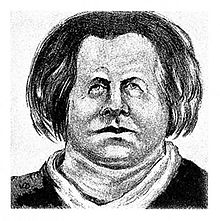Israel Querido

Israël Querido (born October 1, 1872 in Amsterdam , Netherlands ; † August 5, 1932 there ) was a Dutch writer who, after the turn of the century, alongside Herman Heijermans (1864–1924), was one of the most famous, albeit neglected in Germany, figures of the Dutch Naturalism belonged.
Born into a Jewish - Sephardic family of Portuguese origin, he worked as a watchmaker , jeweler , in the diamond industry , as a violinist and journalist . As a writer he made his debut in 1893 with a collection of poems entitled "Verzen" , soon followed by "Gedichten" (1894), written under the impression of a visit to Paris.
Querido's first prose work "Levensgang" (1901) was extremely naturalistic and based on the model of Émile Zola . Then he published "Daarna volgde Menschenwee" (1903). His first major work was the four-volume novel cycle "De Jordaan" , consisting of: "De Jordaan" (1912), "Van Nes en Zeedijk" (1914), "Manus Peet" (1922) and "Mooie Karel" (1925). He gradually moved away from naturalism and, following the example of Louis Couperus, wrote another great historical novel cycle: “ De oude waereld, het land van Zarathustra ” (1918–1921). The three-volume work on King Xerxes and the Persian Empire was illustrated by Willem Adriaan van Konijnenburg (1868–1943).
His older brother was the publisher Emanuel Querido (1871-1943) who founded the publishing house Em. Querido's Uitgeversmaatschappij NV in 1915 and the Querido publishing house in 1933 , which played an important role in German exile literature .
Works (selection)
- Levensgang (1901)
-
Daarna volgde Menschenwee (1903)
- De Jordaan (1912)
- Van Nes en Zeedijk (1914)
- Manus Peet (1922)
- Mooie Karel (1925)
- De oude waereld, het land van Zarathustra . Scheltens & Giltay, Amsterdam 1918–1921.
literature
- SAJ van Faassen: Querido, Israël . In: Biografisch Woordenboek van Nederland Vol. 1 (1979).
| personal data | |
|---|---|
| SURNAME | Querido, Israel |
| BRIEF DESCRIPTION | Dutch writer |
| DATE OF BIRTH | October 1, 1872 |
| PLACE OF BIRTH | Amsterdam |
| DATE OF DEATH | August 5, 1932 |
| Place of death | Amsterdam |